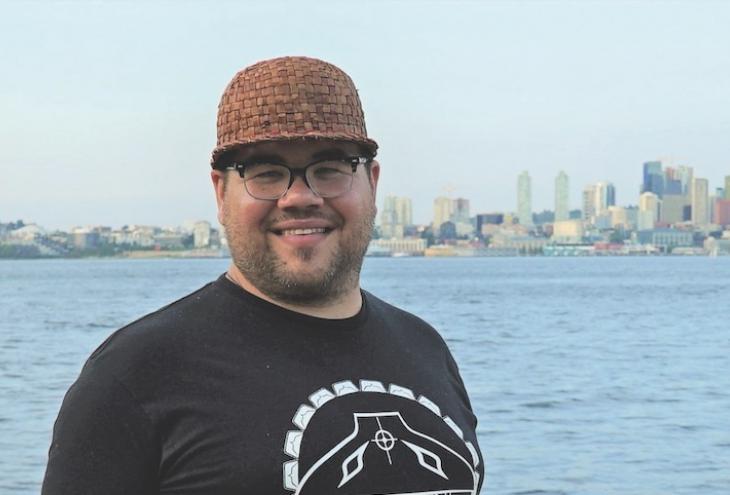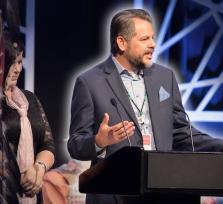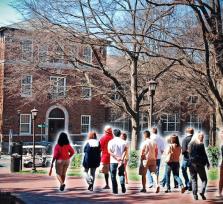At 15, Caleb Dunlap thought he wanted to become a doctor, but admits his grades could have been better. His parents divorced and often, he says, there wasn’t a lot of extra money for the family of five kids living in northern Minnesota. “I’m Ojibwe from Nagaajiwanaang, the Fond du Lac Reservation 30 miles from Chi-gami [the name his people call Lake Superior],” he says.
He is now a technical recruiter for Amazon, with a focus on attracting more Native Americans into careers with the tech giant. That same boy who didn’t have a home computer until he was in seventh grade is now immersed in business of the computer age.
After high school Dunlap moved to California and enrolled in junior college. “I loved junior college,” he says, explaining that’s where he overcame bad advice from a high school teacher who told him Natives are not geared toward science. After junior college he transferred to the University of California at Los Angeles (UCLA) and graduated with a degree in American Indian studies and pre-medicine. “I thought I would go into med school and help my people,” he says.
And he did help his people, working for a time on a tobacco research project. “It was community-based research in Minnesota, among Ojibwe and Dakota peoples,” Dunlap says. “I was really excited to get involved in this because I’ve seen the effects of commercial tobacco on our people.” A few years later, Dunlap would move to Seattle, working at the Chief Seattle Club, a day center for Native people without shelter. “I prefer to call them ‘people without shelter’ rather than ‘homeless,’” he says. Dunlap uses this phrase to combat the stereotypes. “We need to continue to humanize people.”
And then came Amazon, where Dunlap has worked closely with Amazon’s Alexa, Kindle, and International Technology teams. He admits that transitioning to one of the largest corporations in the world was not easy. An initial lesson he had to learn was how to fail. “Here at Amazon we have this understanding of ‘fail often, but learn from it,’” he says. “That was hard for me to wrap my mind around at first.” As a child he saw plenty of examples of failure with alcohol and drug abuse in his community — often the only type of failure he understood. “I had to look at failure as a part of experimentation rather than an end-all. I felt a lot safer with trying and being OK with it not coming out as perfect as I wanted,” he explains.
Now Dunlap is busy trying new ways to recruit Indigenous employees. “We want to be the most preferred place for Natives to work,” and he adds, “and to shop.” If he has his way, there will be an Indigenous marketplace on Amazon and tribes will be ordering items in their own languages using voice-activated Alexa. But Dunlap’s not stopping at Alexa speaking Indigenous languages — he’s looking at economic development in Indigenous communities. “How can we get a fulfillment center to tribal lands?” he wonders.
One way he’s going about his plan is through Indigenous@Amazon, Amazon’s newest employee resource group for Indigenous employees globally, which he founded earlier this year. “As Amazon becomes a global company, our group must think bigger and anticipate the needs of not only Natives here in the U.S., but for all of our Indigenous employees to come,” he says.
Dunlap was heavily involved in AISES at UCLA. He points out with pride that the efforts of their AISES chapter were rewarded with the Outreach and Community Service Award and Chapter of the Year in 2010. “A year after my graduation though,” he jokingly adds. Now he’s bringing Amazon to the National Conference, recruiting alongside companies like Raytheon and Lockheed Martin. “I respect that Natives have worked at these companies, but I want to show Natives there are other options,” he says. “AISES will look different as the world of technology grows. I want to hear Native kids say they want to work at companies like Facebook and Google.”
But most of all, he wants Natives to gravitate to Amazon, where he says there are opportunities for all sorts of skill sets, not just the tech savvy. And Dunlap is casting a wide net. “As a recruiter, I get to influence our business to consider candidates with more diverse backgrounds and experiences,” he says, adding that a resume doesn’t always tell a person’s whole story. He wants to help Amazon understand what the vast and unique Indigenous communities have to offer. “Amazon is such an innovative company, and Native people, we’re just as innovative,” he says. “If there are more Indigenous people here, we can influence Amazon.”










